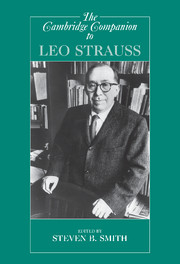Book contents
- Frontmatter
- 1 Introduction: Leo Strauss Today
- 2 Leo Strauss: The Outlines of a Life
- 3 Leo Strauss and the “Theologico-Political Predicament”
- 4 Strauss’s Recovery of Esotericism
- 5 Strauss’s Return to Premodern Thought
- 6 Leo Strauss and the Problem of the Modern
- 7 The Medieval Arabic Enlightenment
- 8 “To Spare the Vanquished and Crush the Arrogant”: Leo Strauss’s Lecture on “German Nihilism”
- 9 Leo Strauss’s Qualified Embrace of Liberal Democracy
- 10 Strauss and Social Science
- 11 The Complementarity of Political Philosophy and Liberal Education in the Thought of Leo Strauss
- 12 Straussians
- Bibliography
- Index
- Series List
9 - Leo Strauss’s Qualified Embrace of Liberal Democracy
Published online by Cambridge University Press: 28 November 2009
- Frontmatter
- 1 Introduction: Leo Strauss Today
- 2 Leo Strauss: The Outlines of a Life
- 3 Leo Strauss and the “Theologico-Political Predicament”
- 4 Strauss’s Recovery of Esotericism
- 5 Strauss’s Return to Premodern Thought
- 6 Leo Strauss and the Problem of the Modern
- 7 The Medieval Arabic Enlightenment
- 8 “To Spare the Vanquished and Crush the Arrogant”: Leo Strauss’s Lecture on “German Nihilism”
- 9 Leo Strauss’s Qualified Embrace of Liberal Democracy
- 10 Strauss and Social Science
- 11 The Complementarity of Political Philosophy and Liberal Education in the Thought of Leo Strauss
- 12 Straussians
- Bibliography
- Index
- Series List
Summary
The topic of Leo Strauss's understanding of democracy and the American regime is fraught with controversy. Strauss's many detractors claim that he was hostile to democracy, and Strauss's students disagree about the implications of his views for the United States. It may help orient the reader if at the outset I state the view for which I shall argue - namely, that in this matter there are compelling reasons to take Strauss at his word. “Wisdom,” he declared, “requires unhesitating loyalty to a decent constitution, and even to the cause of constitutionalism.” The word “even” may appear curious but is easily explained: constitutionalism is a modern version of the rule of law, an approach to governance that, as Strauss often emphasized, leans inherently against arbitrary power, regardless of the specific content of a legal code. At any rate, there can be no doubt that Strauss regarded the U.S. Constitution as decent and as orienting the United States to the rule of law, so far as any polity can maintain that commitment. It is easy to believe that Strauss endorsed modern liberal democracy on essentially negative grounds, as a bulwark against tyrannies of the left and right. This is part of the story, but only part: he also favored it on positive grounds, as a decent form of government that embodied certain partial but nonetheless real goods and virtues. My thesis is exposed to an obvious objection: everybody knows that Strauss sought to restore classical political philosophy as arguably the best account of politics, and classical political philosophy certainly did not endorse democracy as the best form, or even the best achievable form, of political order.
- Type
- Chapter
- Information
- The Cambridge Companion to Leo Strauss , pp. 193 - 214Publisher: Cambridge University PressPrint publication year: 2009
- 5
- Cited by



